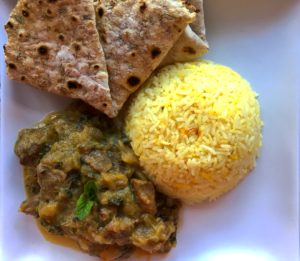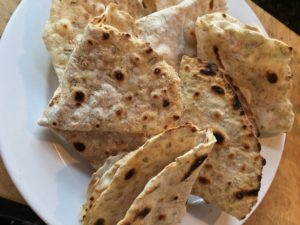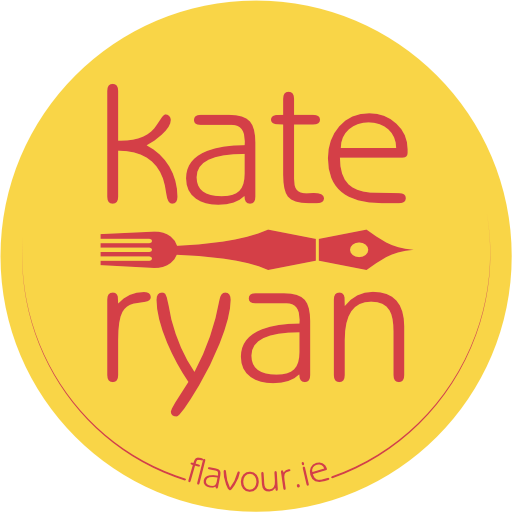OK, so bear with me. Lamb and rhubarb might not be two ingredients that you automatically would put together, but trust me it’s an amazing thing! I came across this ingredient pairing back in 2015 when I was still running my supper club from home, and I wanted to design a menu that was all about rhubarb and how it could be used in both sweet and savoury dishes.
For a good while I was stumped as to how to use it in a main course, but then stumbled upon a Persian dish called Khoresh using lamb and rhubarb. Tweaked and tested until I was happy with the outcome, this is a surprisingly quick dish to make and is deeply savoury. Think of a sweet and sour casserole and you won’t be too far away.
Any version of rhubarb can be used for this, forced or otherwise but the older, naturally grown rhubarb will have a more interesting flavour thanks to its more intense sourness. For the supper club I paired the Khorsesh with a Turkish flatbread called a Yufka flavoured with fennel seeds and served up with saffron infused rice and a refreshing savoury yogurt and rosemary dip.
This quantity of Khoresh will feed between 6-8 people depending on appetites. Also note that, far from looking like a superfluous ingredient, the pomegranate molasses is essentially and happily these days is pretty accessible. But do take care with it as too much can easily overpower the dish, but to not use it is an equal travesty!
For the Khoresh: 
-
2kg of boneless lamb shoulder, trim off skin and fat.
-
4 tblsp of ghee
-
2 large white onions finely sliced
-
1 small pinches of saffron threads soaked in a little boiling water.
-
1 tblsp on pomegranate molasses
-
500ml of good quality chicken stock
-
1 large handful each of chopped mint and parsley
-
500g of rhubarb, trimmed
Method:
-
Cut the lamb into 3cm cubes and season with sea salt and black pepper. Brown the lamb in batches and set aside.
-
To the same pan, add the onions, add a little more ghee to stop it sticking. Cook the onions over a medium heat until golden brown, stirring frequently.
-
Return the meat to the pan, and add the saffron threads and the soaking liquid, pomegranate molasses and stock.
-
Bring to the boil then turn down the heat, cover and leave to cook for at least one hour. Stir occasionally to prevent sticking to the pan.
-
In a frying pan, heat a little olive oil and add the chopped mint and parsley to release their flavour, but not burning them. Stir the herbs into the stew and continue to simmer uncovered for a further 30 minutes or so until the sauce has thickened and the meat has become tender.
-
Cut the rhubarb into 3cm chunks, add to the stew and cook for a further 10 minutes or so. The rhubarb should retain itself and not turn into a jam.
 Fennel Seed Yufka:
Fennel Seed Yufka:
Method:
-
Sift the flours and salt into a bowl and add the toasted fennel seeds. Mix together with your fingers, then make a well in the centre of the bowl and add the water gradually drawing in the flour from the sides and knead it into a firm dough.
-
Divide the dough into 6 pieces and roll them into balls, leave to rest on a floured surface covered with a damp cloth for 30 minutes. Flatten the balls and roll them out into circles as wide and as thin as possible dusting with flour to prevent them from sticking. Heat a griddle pan until very hot. Shake off the excess flour off the yufka and cook each side for about 30 seconds so that they brown in places.
Serve up the hot Yufka with the Khoresh, saffron rice and a dip made with greek yoghurt seasoned with sea salt and finely chopped rosemary.
ENJOY...


